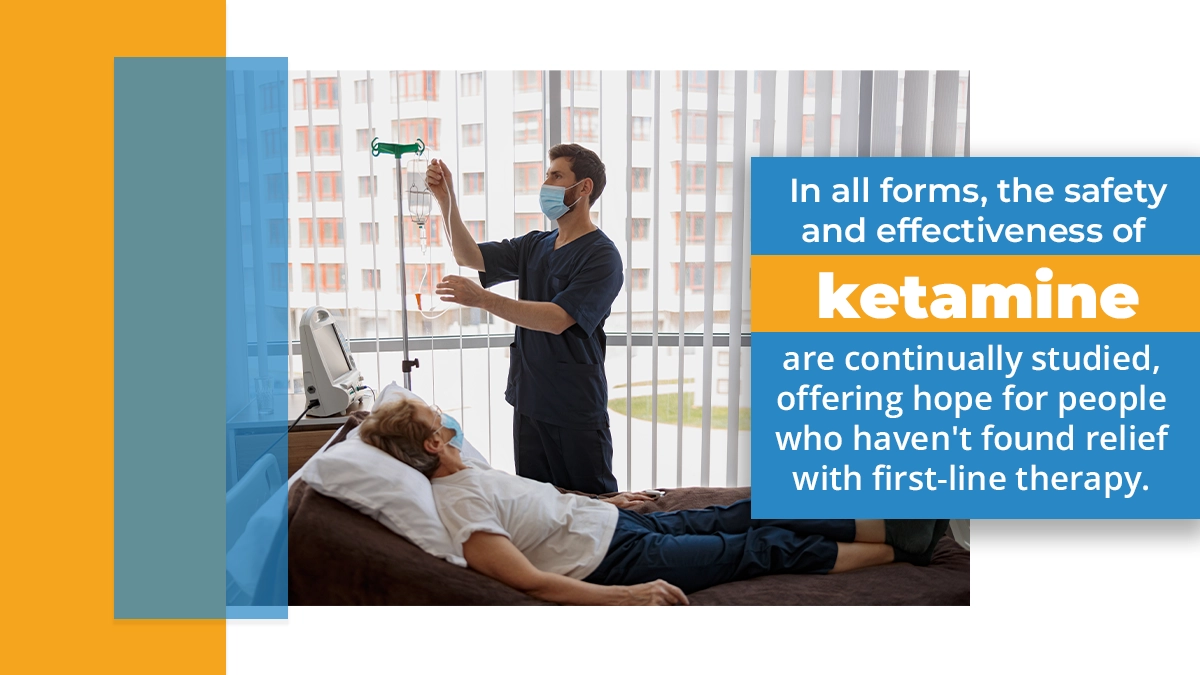
Does Insurance Cover Suboxone Treatment Costs
Explore the basics of insurance coverage for suboxone treatment in this guide from The Recovery Team-Newton.

Ketamine infusion therapy is a new and promising treatment for various mental health conditions. This therapy involves administering ketamine, a medication traditionally used for anesthesia, in low doses through an IV. Ketamine infusion therapy is gaining attention because it works quickly, often providing relief within hours or days.
If you’re struggling with mental health issues and looking for new options, ketamine infusion therapy might be worth considering. Read further to learn the basics about ketamine infusion therapy and how it works.
Ketamine therapy offers quick symptom relief for treatment-resistant depression and other mental health issues. Here’s what you need to know:
The Recovery Team-Newton offers services to help you regain control of life. Call us today at (508) 978-2772 for more information.
Ketamine infusion therapy has a fascinating history, beginning with its use as an anesthetic in the 1960s. Researchers soon discovered its potential beyond anesthesia, particularly for mental health issues like treatment-resistant depression. Over the decades, numerous studies highlighted ketamine’s rapid effects on depression symptoms, especially when traditional medications failed.
In recent years, clinical settings have adopted ketamine therapy for treating not only depression but also substance use disorders. This treatment, administered through intravenous infusion, allows for precise dosing and quick results. This method has proven effective in providing relief when other treatments have fallen short.
Ketamine’s development from an anesthetic to a crucial part of mental health treatment plans underscores its significant impact. Today, it offers hope for many patients struggling with severe depression and substance use disorders, marking a new era in mental health care.
Ketamine’s mechanism of action involves several complex processes in the brain. Primarily, it works by increasing the amount of a neurotransmitter called glutamate, which plays a crucial role in mood regulation.
This increase helps to stimulate nerve cells and enhance communication between different parts of the brain, which is particularly beneficial for people with major depressive disorder and major depression. In addition to its effects on depression, ketamine is effective in treating neuropathic pain. The drug acts quickly, providing relief when other treatments have failed.
Intranasal esketamine, a form of ketamine administered via nasal spray, also utilizes this mechanism to offer rapid improvement in symptoms. Throughout ketamine therapy, monitoring vital signs is essential to ensure patient safety.
In all forms, the safety and effectiveness of ketamine are continually studied, offering hope for people who haven’t found relief with first-line therapy. It is FDA-approved and has the following types:
IV ketamine infusions are the most common form of ketamine therapy. In a hospital setting, people receive the drug ketamine through an IV, allowing for precise control over the dosage. This method is particularly effective for treating mental disorders like treatment-resistant depression. Studies have shown the effectiveness of ketamine in quickly alleviating symptoms where other treatments have failed.
Ketamine injections, administered intramuscularly, offer another way to deliver ketamine therapy. This method involves injecting lower doses of the drug into the muscle, providing a slower release than IV infusions. While not as common, IM injections can be effective for some people, especially when IV access is not ideal.
Nasal spray administration, specifically with the drug esketamine, is a newer method of ketamine therapy. People can use this form of ketamine therapy in both clinical and home settings, making it more accessible. The nasal spray is designed for those who have a major depressive disorder and experience suicidal ideation.
Oral ketamine is another form of administration, taken in pill form. While less common than other methods, it provides an option for those who prefer taking medication orally. This form is typically used in lower doses and is not usually the first-line therapy due to its slower absorption rate. However, it remains a viable option within a comprehensive treatment plan.
Ketamine has emerged as a groundbreaking option in the treatment of psychiatric disorders. This innovative approach offers new hope for the management of psychiatric disorders that are resistant to conventional treatments.
Ketamine is increasingly used in the treatment of psychiatric disorders, especially for major depressive disorder. It has shown significant effectiveness in reducing depressive symptoms, often working faster than traditional antidepressants like selective serotonin reuptake inhibitors (SSRIs). For many patients who haven’t found relief with other medications, ketamine offers new hope.
Ketamine therapy is also beneficial for anxiety disorders. Targeting specific receptors in the brain helps alleviate symptoms more rapidly than standard treatments. Patients with severe anxiety who haven’t responded to conventional therapies may find significant relief with ketamine, making it an important option in the management of mental health disorders.
For individuals who have PTSD, ketamine provides a promising treatment option. Its ability to modulate brain receptors involved in stress and fear responses offers quick and effective symptom relief. Unlike many other medications, ketamine can work rapidly, providing much-needed relief for those struggling with PTSD.
Ketamine is also used in the treatment of bipolar disorder. Patients experiencing severe depressive episodes can benefit from ketamine’s fast-acting properties. Unlike traditional antidepressants, ketamine doesn’t carry the same risk of triggering manic episodes, making it a valuable tool in managing bipolar disorder.
Starting ketamine infusion therapy is straightforward and begins with a consultation. First, you’ll meet with a healthcare provider who specializes in ketamine therapy to discuss your medical history and current symptoms. This initial step is crucial to determining if ketamine is the right treatment for you.
Once approved, doctors will tailor your treatment plan to your specific needs. Ketamine is given through an IV infusion in a clinical setting, ensuring safety and monitoring. Each session lasts about forty minutes to an hour, and you might need multiple sessions to see the best results.
You’ll be closely monitored during the infusion to ensure your vital signs are stable. Most people start to feel the benefits within hours or days, providing rapid relief from symptoms like depression, anxiety, and PTSD. After your sessions, follow-up appointments will help assess your progress and make any necessary adjustments to your treatment plan.
If you or someone you know is dealing with addiction to drugs like ketamine and want to seek professional help, then reach out to The Recovery Team-Newton.
Our treatment program offers you a structured environment to help you overcome substance use disorders (SUDs) in a supportive setting. We offer medication-assisted treatment to alleviate symptoms of substance abuse through behavioral therapies and medications.
In addition, we offer a dual diagnosis program for those who are also facing mental health issues along with substance use problems.
To learn more about our services, please call (508) 978-2772 today.
Ketamine therapy is generally more expensive than traditional depression treatments. Costs can vary widely based on location and treatment frequency, but a single ketamine infusion typically ranges from $400 to $800. Traditional therapies, like antidepressants and psychotherapy, often have lower initial costs but may require ongoing medication and multiple therapy sessions.
While ketamine therapy might have higher upfront costs, it can offer faster relief, potentially reducing long-term expenses related to chronic depression. However, insurance coverage for ketamine therapy is limited, so it’s important to check with your provider about costs and coverage options.
Ketamine infusion therapy involves receiving ketamine through an intravenous (IV) line in a clinical setting. During the session, you’ll sit comfortably while the medication is administered over forty minutes to an hour.
Some people may feel lightheaded or experience mild dissociation, but this usually passes quickly. The treatment is closely monitored to ensure safety and effectiveness. Afterward, you can resume normal activities, although having a friend or family member accompany you is recommended, as you may feel drowsy.
Ketamine treatment for depression typically lasts about 40 minutes to an hour per session. Patients usually start with a series of six infusions over two to three weeks. This initial treatment phase aims to provide rapid relief from depressive symptoms.
Following this, maintenance infusions are often scheduled based on individual needs and responses, generally ranging from once a week to once a month. The exact duration and frequency of treatment can vary, so it’s important to work with a healthcare provider to tailor the plan to your specific condition and ensure the best outcomes.

Explore the basics of insurance coverage for suboxone treatment in this guide from The Recovery Team-Newton.

Explore the effectiveness of medication-assisted treatment with The Recovery Team-Newton.

Explore the examples of dual diagnosis and its treatment plans for better outcomes with The Recovery Team-Newton.